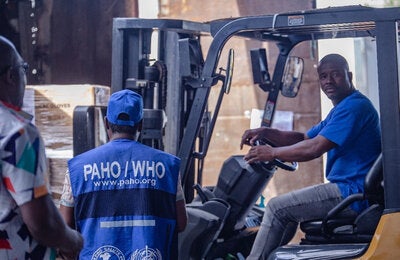
Paramaribo, March 23, 2023 (PAHO) – Influenza pandemics are recurring events that pose a major global health security threat due to their unpredictability and their potentially devastating consequences on health and economies around the world. These events are difficult to predict, and the ongoing COVID-19 pandemic as well as the 2009 influenza A (H1N1) pandemic have highlighted both successes and shortcomings in pandemic preparedness activities, especially in the areas of vaccine deployment and public acceptance of vaccination.
In response to this, the Infectious Hazard Management (IHM) Unit of the Public Health Emergencies (PHE) Department and the Comprehensive Family Immunization (IM) Unit of the Family, Health Promotion, and Life Course (FPL) Department and Suriname Country Office from the Pan-American Health Organization / World Health Organization (PAHO/WHO) conducted a national workshop from March 21-23, 2023 to review the current National COVID-19 Deployment and Vaccination Plan and further develop their National Deployment and Vaccination Plan (NDVP) for influenza and other respiratory viruses that may cause a pandemic, including both preparedness and response components.
The workshop aimed at providing an understanding of the components of national deployment plans for pandemic influenza and other respiratory viruses, identify best practices from COVID-19 experiences, and provide familiarity with WHO tools to support the development and updating of national deployment and vaccination plans. The expected outcome of the workshop included an advanced draft of Suriname's NDVP, clear next steps for finalizing it, and addressing identified preparedness strengthening activities. An up-to-date and pertinent NDVP facilitates pandemic response and promotes preparedness efforts while keeping stakeholders informed and involved in achieving preparedness objectives. It also encourages ongoing alignment of operational and strategic practices with the latest technological advancements, ensuring that all parties are prepared to work together in the event of a pandemic.
Attendees included representatives from the Ministry of Health and other governmental agencies involved in pandemic preparedness, the National Expanded Programme on Immunization (EPI), incident managers and their counterparts, logistics and vaccination operations specialists (including supply chain and customs clearance), regulatory authorities from the National Medicine Agency, and partners such as international organizations, civil society, and NGOs. This diverse group of participants is expected to support Suriname's national pandemic preparedness and response activities. The goal of the workshop is to develop a plan that will enable effective and efficient deployment of pandemic supplies, including vaccines, to tackle morbidity and mortality during a pandemic.
This workshop took place under the auspices of the Pandemic Influenza Preparedness Framework, which is working to strengthen global pandemic preparedness, with a focus on pandemic vaccine deployment. The goal was to capitalize on the lessons learned during the COVID-19 response efforts and engage countries in adapting and developing national plans for respiratory virus deployment and vaccination, with applicability for other vaccination efforts. Delays or failure in ensuring availability, access, and distribution of pandemic vaccines may have dire consequences for populations in need, making effective and efficient deployment of pandemic supplies, including vaccines, particularly critical.
During the opening remarks at the national workshop PAHO/WHO Representative Suriname Dr. Lilian Reneau-Vernon highlighted the importance of the event and stated that the workshop would enable participants to share best practices and experiences, learn from each other and identify potential areas for collaboration to work towards the common goal of ensuring that the health and well-being of all Surinamese citizens are protected.
Oscar Mesones Lapouble, PAHO Technical Officer, Public Health Emergencies & Tropical and Vector-borne Diseases, Ioana Ghiga WHO, Francisco Nogareda, FPL/IM PAHO, Lidia Redondo, PHE/IHM PAHO
The workshop was facilitated by national experts and international experts that shared presentations on various topics related to pandemic preparedness and vaccination. Lidia Redondo, PHE/IHM PAHO, highlighted the importance of the PAHO regional roadmap and the planning for respiratory pathogen pandemics. Francisco Nogareda, FPL/IM PAHO, talked about pandemic influenza vaccination objectives, priority groups, strategies, and challenges. In addition, Ioana Ghiga from WHO spoke about the Pandemic Influenza Preparedness (PIP) Framework and National Deployment and Vaccination Plans.
“The Ministry of Health in Suriname is very pleased with the facilitation by PAHO/WHO to host this workshop, where all stakeholders can receive an update on the important aspects to conduct a National Deployment and Vaccination Plan. And in particular, this workshop is about a vaccination plan regarding influenza and others that can cause respiratory symptoms and have the potential to result into a pandemic.
It is important to get ahead of a potential pandemic, and we are very happy to be involved, because one country cannot do it alone, we can make sure that the other viruses do not reach the level of COVID-19 and we can be very swift in protecting our citizens through vaccination". - Director of the Ministry of Health Dr. Rakesh Gajadhar Sukul
Dr. Vern Nanhoe, from the Bureau of Public Health / Ministry of Health Suriname (BOG/MoH), shared Suriname's COVID-19 pandemic response experience. He added that “It is very important to have a plan in place as part of preparedness for another potential pandemic. The aim is to have standard operating procedures, as a blueprint, to follow for everyone in order to be fully prepared in various fields on handling the situation.”
This was followed by Dr Richard Kartomo, Expanded Programme on Immunization (EPI) Manager from the BOG/MoH on the national vaccine deployment and vaccination against COVID-19. The final presentation was on the national vaccine acceptance and uptake, in addition the risk communication strategies, how to deal with community resilience and management and science communication.
In conclusion, the workshop aimed to improve vaccine deployment planning in Suriname by utilizing tabletop exercises, presentations, and group activities. Participants identified areas of transformation in the current plan and develop a revised or new National Deployment and Vaccination Plan. The workshop provided an understanding of the components of national deployment plans for pandemic influenza and other respiratory viruses, identified best practices from COVID-19 experiences, and provided familiarity with WHO tools to support the development and updating of national deployment and vaccination plans. The expected outcome of the workshop included an advanced draft of Suriname's NDVP, clear next steps for finalizing it, and addressing identified preparedness strengthening activities.





